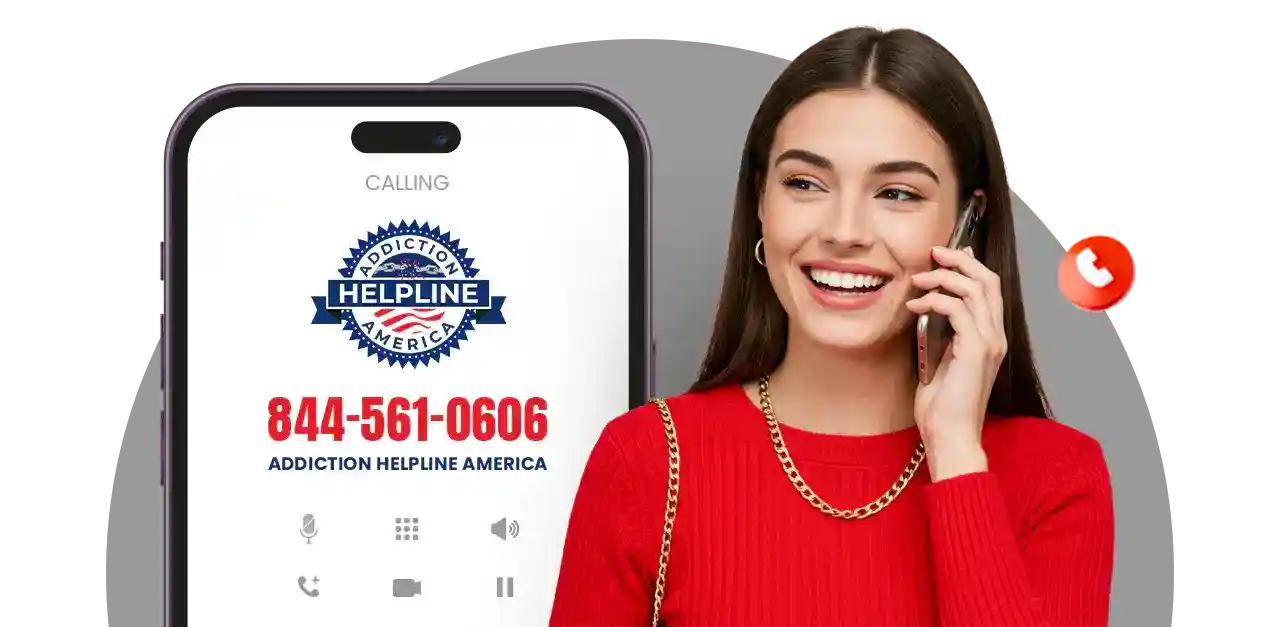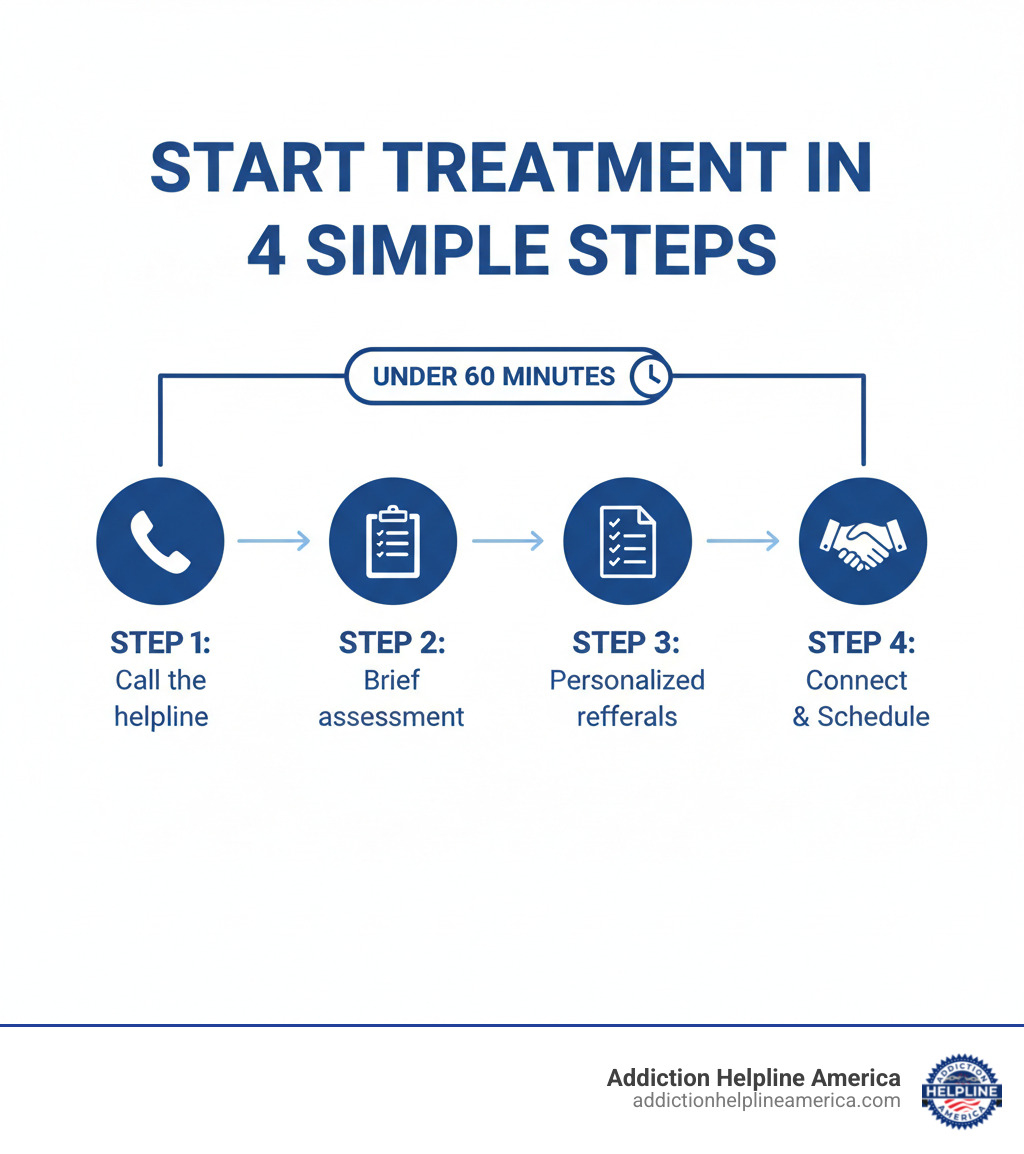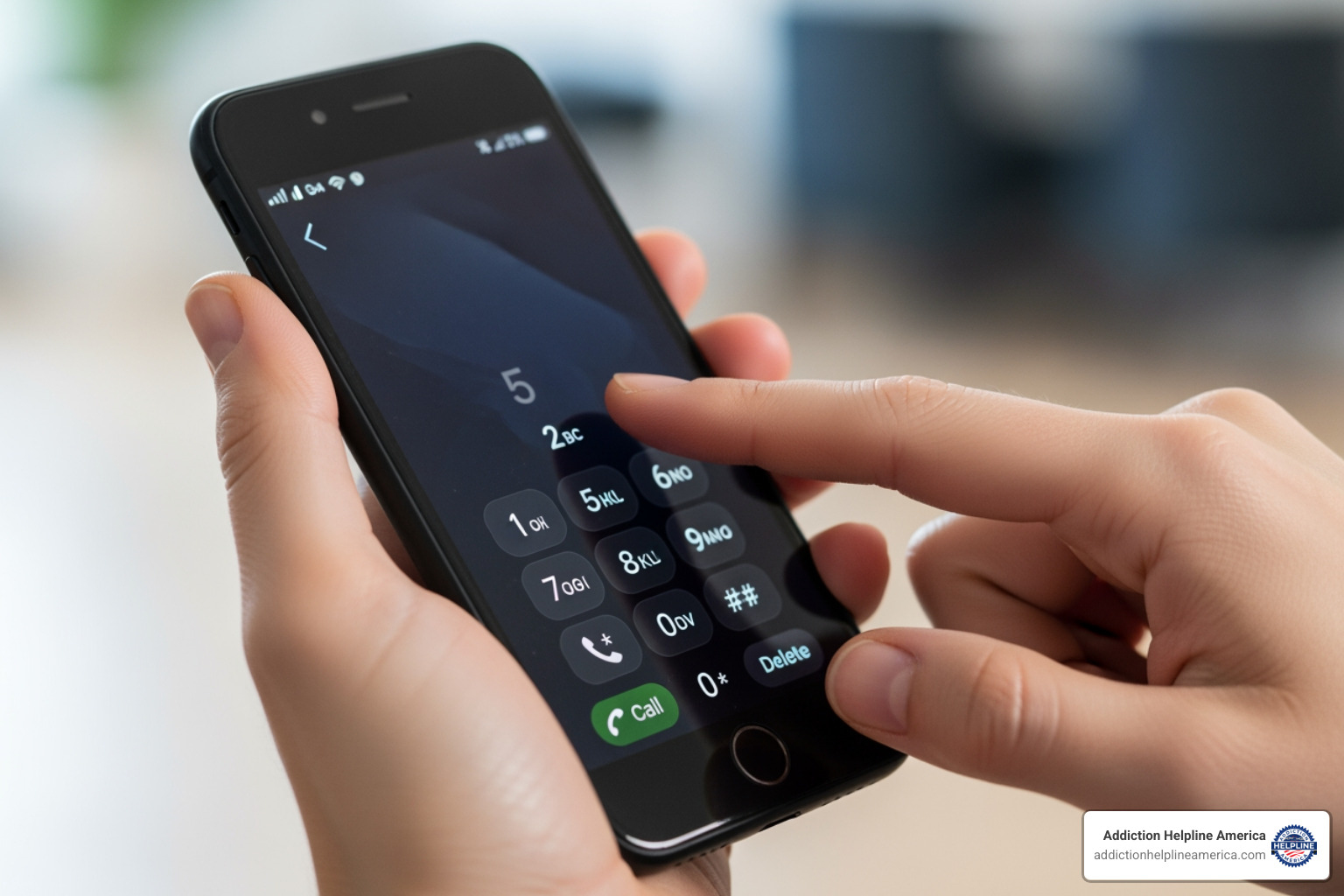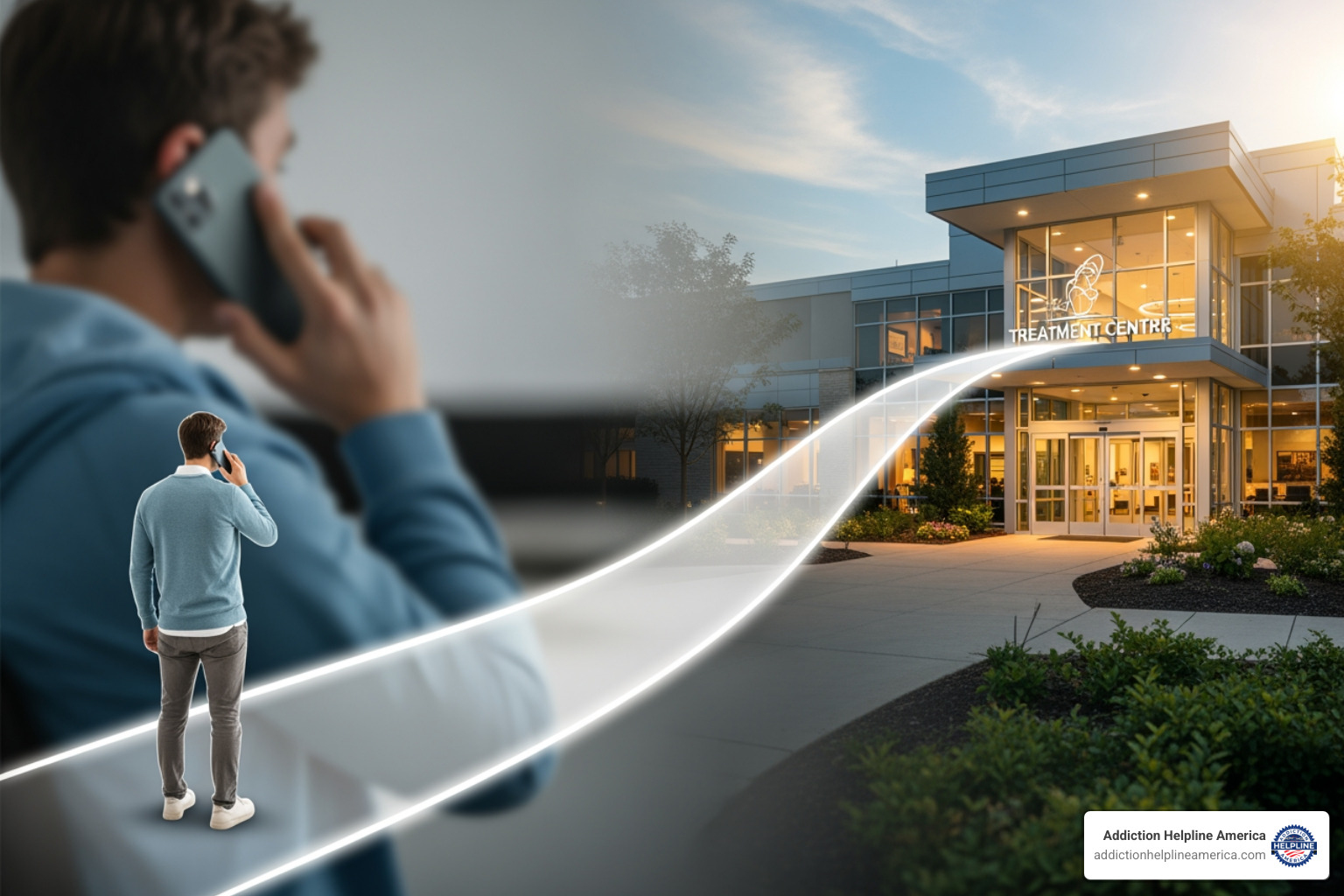
Why a Substance Abuse Treatment Helpline Can Change Everything
A substance abuse treatment helpline is a free, confidential phone service available 24/7 that connects individuals struggling with addiction—or their loved ones—to treatment options, support, and resources. Here’s what you need to know:
- Who can call: Anyone seeking help for themselves or a loved one
- What they offer: Screening, treatment referrals, insurance verification, and immediate crisis support
- How it works: Trained specialists assess your needs and connect you directly to appropriate treatment programs
- Cost: Completely free, no insurance required to call
- Confidentiality: All calls are anonymous and protected
Nearly 49 million people in the United States meet the criteria for a substance use disorder, yet only about 1 in 4 people who need treatment actually receive it. The gap between needing help and getting help often comes down to one thing: knowing where to start. A helpline removes that barrier by providing immediate guidance and a clear path forward—often connecting you to treatment in less than an hour.
At Addiction Helpline America, our experienced addiction specialists and counselors provide compassionate, 24/7 support. We operate a substance abuse treatment helpline that connects thousands of callers each month to life-changing treatment programs nationwide.

Substance abuse treatment helpline terms explained:
- National Drug Abuse Hotline Numbers: Free Addiction Help 24/7
- addiction treatment programs
- addiction help online
What is a Substance Abuse Helpline and How Does It Work?

A substance abuse treatment helpline is your direct line to help when you need it most. It’s a free, confidential phone service that connects you with real people who understand what you’re going through and can guide you toward the right treatment options.
These helplines operate 24 hours a day, 7 days a week, meaning support is available whenever you’re ready—day or night.
Anyone can call. If you’re struggling with addiction yourself, you can reach out. If you’re a family member watching someone you care about spiral, you can call. Friends, partners, even professionals looking for resources—everyone is welcome. There’s no wrong reason to pick up the phone.
Calling doesn’t mean you’re committing to anything. You’re not signing up for treatment just by dialing a number. You’re simply opening a conversation, asking questions, and exploring what’s possible. There’s no pressure or judgment, just honest information and support.
The benefits are immediate. You’ll talk to an expert, learn about new options, see a path forward, and realize you’re not alone in this.
More info about addiction and rehab hotlines
Call Now – Your Journey to Recovery Begins Today!

Take the first step towards a healthier life! Call now to connect with our compassionate team and start your recovery journey today. Your path to healing awaits!
Our recovery specialists are available 24/7 to provide support, and all calls are confidential and free. Reach out anytime – we’re here to help!
The Role of Helpline Specialists
When you call a substance abuse treatment helpline, you’re not talking to a robot or someone reading from a script. You’re connecting with trained advisors—often clinicians and counselors who’ve spent years working in addiction treatment. Many have walked their own recovery journey or supported loved ones through it, so they bring both professional expertise and genuine empathy to every conversation.
These specialists understand that calling for help takes courage. They know you might be scared, ashamed, or exhausted. That’s why they offer non-judgmental guidance from the moment you say hello. They’re there to listen first, understand your unique situation, and then help you figure out what comes next.
Helpline specialists are information providers, not ongoing counselors. They won’t be your therapist, but they will help you find one. They answer questions, explain options, and connect you to professionals for deeper support.
What Services Do Helplines Offer?
A comprehensive helpline does much more than just answer the phone. When you call, specialists can provide screening and assessment to understand what you’re dealing with—what substances are involved, how long this has been going on, and whether there are other mental health concerns that need attention.
Based on that conversation, they’ll help you with treatment referrals, connecting you directly to programs that fit your specific needs and location. They’ll explain what information on addiction is relevant to your situation, breaking down complicated medical terms into language that makes sense.
Understanding treatment options can be confusing. Specialists take time explaining treatment options—like inpatient versus outpatient, when detox is necessary, and what level of care might work best for you. What Is Alcohol Rehab Guide
Money is often a huge concern, so specialists also help with verifying insurance. They can check what your insurance covers, find facilities that accept your plan, or point you toward free and low-cost options if you don’t have coverage.
Finally, they’re experts at locating resources beyond just treatment centers—support groups, family counseling, community programs, and anything else that might help you or your loved one build a strong foundation for recovery.
Your First Step: The Call to a Substance Abuse Treatment Helpline

Picking up the phone to call a substance abuse treatment helpline can feel overwhelming. It’s normal to feel anxious or wonder if you need help. But you don’t have to have it all figured out before you call.
The process is simpler than you might expect. When you reach out to our substance abuse treatment helpline, you’re not committing to anything. You’re just starting a conversation to gather information and explore your options.
Building trust takes time. Some people feel ready to share their whole story on the first call. Others need a few conversations before they open up completely. Both are perfectly okay. You can call as many times as you need. There’s no pressure, no judgment, and no rush. We’re here whenever you’re ready.
You’re not alone in reaching out. Our helplines field thousands of calls every single month from people just like you—people who are scared, hopeful, confused, and brave enough to ask for help. That first call is often the hardest part, but it’s also the most important.
Preparing for Your Call: What Information to Have Ready
You don’t need to prepare a speech. But having a few details on hand can help our specialists give you the most helpful guidance possible.
It helps to think about your substance use history—what substances you’ve been using, roughly how long this has been going on, and how often you’re using. Even a general idea is useful.
Many people dealing with substance use also struggle with co-occurring mental health conditions like anxiety, depression, or bipolar disorder. These conditions often go hand-in-hand with addiction, and treating both together leads to better outcomes. If you’ve been diagnosed with anything or suspect you might be dealing with mental health challenges, mentioning this helps us connect you to programs that specialize in dual diagnosis treatment.
If you have insurance information handy, that’s great—we can help verify your coverage and find treatment centers that work with your plan. But if you don’t have insurance, please don’t let that stop you from calling. We work with state-funded programs and can explore financial assistance options.
Think about your location preferences too. Some people want to stay close to home, while others feel a fresh start in a new place would help. Our nationwide network spans from Alabama to Wyoming, so we can help you find the right fit wherever you are or want to be.
If you’ve tried treatment before, sharing what worked and what didn’t helps us make better recommendations. Previous treatment attempts teach us valuable lessons about what you need to succeed.
Calling about someone you love? We can help with that too. Gather whatever information you can about their situation, and we’ll guide you on how to approach them with compassion and support.
What Happens During the Call?
Here’s what happens when you call our substance abuse treatment helpline.
The initial greeting is warm and reassuring. A trained specialist will answer, introduce themselves, and immediately let you know that everything you share is completely confidential.
Next comes a few brief screening questions. These aren’t invasive; they help us ensure you’re safe and understand if you’re calling for yourself or a loved one. If you’re in immediate danger, we’ll make sure you get urgent help right away.
The needs assessment is where you get to tell your story. This is the heart of the call. Our specialist will listen without judgment, asking gentle questions to understand your situation, what you’ve been through, and what kind of help feels right to you. You’re in control of how much you share.
After understanding your needs, we move into a discussion of options. Our specialist will explain the different types of treatment that might work for you, breaking down what inpatient and outpatient programs look like, what detox involves, and how different approaches might fit your life. Feel free to ask any questions you have.
Finally, we work together to find personalized solutions. Based on everything you’ve shared, we’ll identify specific treatment centers from our extensive network that match your needs, location, and financial situation. We’ll explain what makes each option a good fit and help you understand your next steps.
We won’t pressure you to commit to anything. This call is about empowering you with information and choices. You get to decide what feels right and take your time making that decision.
Call Now – Your Journey to Recovery Begins Today!

Take the first step towards a healthier life! Call now to connect with our compassionate team and start your recovery journey today. Your path to healing awaits!
Our recovery specialists are available 24/7 to provide support, and all calls are confidential and free. Reach out anytime – we’re here to help!
From Call to Connection: The Next Steps in Your Recovery Journey

The call to a substance abuse treatment helpline is the first step. We’re here to turn that conversation into tangible help and make the transition as seamless as possible.
Once we’ve identified treatment programs that fit your needs, our specialists will guide you through the referral process. This isn’t about handing you a phone number and wishing you luck. We actively connect you to the admissions team at the recommended facility. We provide a warm handoff, often staying on the line with you to make the introduction and ensure you feel supported.
We can also help with appointment scheduling assistance, walking you through what happens next. Our goal is simple: get you from “I need help” to “I’m getting help” with as few obstacles as possible. We help bridge the gap between making a decision and taking action, where many people get stuck.
Our support doesn’t end when you hang up. We offer follow-up support to check in, answer new questions, and make sure you’re comfortable with the path you’ve chosen. Recovery is a journey, and we’re committed to walking alongside you. If you’re thinking about life after initial treatment, exploring options like sober living can be an important next consideration.
Exploring Your Treatment Options
Understanding what’s out there can feel overwhelming. There are different levels of care, approaches, and environments designed to meet people where they are. When you call our substance abuse treatment helpline, we’ll explain these options in plain language, helping you find the path that makes the most sense.
Medical detox is often the first step. This is medically supervised withdrawal from substances, where trained professionals monitor you around the clock to safely manage withdrawal symptoms and prepare your body for the next phase of treatment. If you’re physically dependent on alcohol, opioids, or certain other substances, detox is typically necessary.
Inpatient or residential rehab means living at a treatment facility full-time, usually for 30, 60, or 90 days. You’re in a structured environment, removed from daily triggers, with access to comprehensive therapy, medical support, and peer connections. This level of care is ideal for those who need intensive support.
Inpatient Alcohol Rehab Complete Guide
Outpatient programs offer more flexibility. You attend therapy sessions during the day or evening but continue living at home. Intensities vary: Partial Hospitalization Programs (PHP) require several hours a day, multiple days a week, while Intensive Outpatient Programs (IOP) are less demanding. Outpatient care works well for people with strong home support or those transitioning from inpatient treatment.
Medication-Assisted Treatment (MAT) combines FDA-approved medications with counseling and behavioral therapies. This approach is particularly effective for opioid and alcohol use disorders, helping to reduce cravings and manage withdrawal. It’s not replacing one drug with another—it’s using medicine as a tool to support recovery.
Find medication-assisted treatment (MAT).
Dual diagnosis treatment addresses both substance use and co-occurring mental health conditions like depression, anxiety, or PTSD. These conditions often fuel each other, so treating them together is crucial for lasting recovery. If you’re struggling with trauma alongside addiction, specialized programs can provide the integrated care you need.
Our specialists will help you understand which of these options aligns with your specific needs, insurance coverage, and personal circumstances. There’s no one-size-fits-all answer. Recovery is deeply personal, and finding the right fit matters.
Finding the Right Helpline for Your Needs
Not all helplines are created equal, and understanding your options can help you find the support that best fits your situation. The landscape of support services is diverse, ranging from general helplines to specialized resources. While we at Addiction Helpline America offer a comprehensive national substance abuse treatment helpline, understanding all your options is helpful.
Some helplines provide broad support for any substance use concern, while others focus on particular substances, age groups, or communities. Many also offer online treatment locator tools that can help you search for facilities in your area. The key is finding a service that feels right for you and can connect you to the specific type of care you’re seeking.
Treatment Approaches for Drug Addiction DrugFacts
National, State, and Specialized Helplines
When you’re ready to reach out, you have several options depending on your location and specific needs.
National helplines like Addiction Helpline America operate across all 50 states and the District of Columbia, connecting you to a vast network of treatment centers nationwide. We provide free, confidential, personalized guidance to help you find the right recovery program custom to your unique situation—whether you’re in Alabama or Wyoming or anywhere in between. Our specialists understand the treatment landscape across the country and can help you steer your options regardless of where you live.
Contact Addiction Helpline America
State-specific hotlines can be valuable resources as well, particularly if you’re looking for information about state-funded programs or locally available services. Each state has its own network of resources, and these hotlines often have deep knowledge of what’s available in your community. For instance, if you’re in California, you might benefit from exploring state-specific resources alongside national options.
California Substance Abuse Drug Addiction Hotlines
Specialized hotlines serve specific populations who may face unique challenges or need custom support. Veterans, for example, often benefit from connecting with peers who understand military culture and service-related trauma. LGBTQ+ individuals may seek helplines that understand the particular stressors and discrimination that can contribute to substance use in their community. These specialized services can provide an extra layer of understanding and connection.
Here are some reputable helplines that can provide support:
- 988 Suicide & Crisis Lifeline: Call or text 988 anytime for immediate support during mental health crises, suicidal thoughts, or substance use crises.
- Veterans Crisis Line: For veterans and their loved ones, call 988 and press 1, text 838255, or chat online at veteranscrisisline.net.
Alternative Contact Methods: Text and Chat Helplines
We know speaking on the phone about substance abuse can be overwhelming. That’s why many substance abuse treatment helpline services, including ours, offer alternative ways to reach out—through text and chat.
These alternative contact methods provide anonymity and comfort that can make all the difference. If you’re struggling with the decision to seek help, typing a message can feel far less intimidating than speaking aloud. There’s no voice to crack, no awkward pauses, just you and your words on a screen.
Discretion is another powerful benefit. You can reach out for help from anywhere—during your lunch break, while your family is in another room, or when you simply need privacy. You can communicate at your own pace, taking time to gather your thoughts and process the information you receive without feeling rushed.
To access our text or chat services, you can visit our website or use our designated contact methods. The support you receive through these channels is just as comprehensive and compassionate as what you’d get on the phone.
Mental Health Helpline Text Guide
Frequently Asked Questions about Helplines
Is a substance abuse treatment helpline confidential?
Confidentiality is fundamental to how our substance abuse treatment helpline operates. Every call, text, or chat you have with us is completely confidential. In most cases, you can remain anonymous if you choose—you don’t even need to provide your real name. We understand that talking about substance use can feel vulnerable, and we want you to feel safe.
Our services are fully HIPAA compliant, which means we follow strict federal privacy laws designed to protect your personal health information. What you share with our specialists stays between you and them. This creates a genuinely safe space where you can speak openly, ask questions without embarrassment, and explore your options without fear of judgment or exposure.
Can I call a substance abuse treatment helpline for a family member?
Yes. Our substance abuse treatment helpline isn’t just for those personally struggling with addiction. We receive countless calls from worried parents, spouses, siblings, and friends every day. Reaching out for guidance is one of the most loving things you can do.
When you call on behalf of someone you care about, our specialists can help you understand what you’re observing, explain the nature of addiction, and guide you on how to approach your loved one about getting help. We can discuss intervention strategies, connect you with family support resources, and help you understand what treatment options might be appropriate for their situation.
Addiction doesn’t just affect the person using substances—it ripples through entire families. That’s why we also focus on helping you take care of yourself during this difficult time. We can point you toward resources specifically designed for families.
What Is Substance Abuse Treatment? A Booklet for Families
Are substance abuse treatment helplines free?
Yes, calling our substance abuse treatment helpline costs you nothing. The call itself is toll-free, and all the services we provide—screening, assessment, guidance, and referrals—are completely free of charge.
We believe access to help should never depend on your ability to pay. Your insurance or financial status doesn’t matter when you call us. You don’t need insurance to pick up the phone and talk to one of our specialists. You won’t receive a bill. There are no hidden fees.
Our mission is to remove every possible barrier between you and the help you need. The information, support, and connections we provide are our gift to you, no strings attached. We’re here to guide you through those crucial first steps toward recovery and make them as accessible as possible for everyone.
Call Now – Your Journey to Recovery Begins Today!

Take the first step towards a healthier life! Call now to connect with our compassionate team and start your recovery journey today. Your path to healing awaits!
Our recovery specialists are available 24/7 to provide support, and all calls are confidential and free. Reach out anytime – we’re here to help!
Conclusion
Making the first call takes real courage, but it’s the step that changes everything. We know it can feel overwhelming, but from helping thousands of people, we’ve learned there’s no perfect time, only this moment.
Our substance abuse treatment helpline is fast, confidential, and free of judgment. In less than an hour, you can go from feeling lost to having a clear plan with people ready to help you take the next step. It’s not just about information; it’s about connection, understanding, and finding the treatment that’s right for your unique situation.
Recovery is happening every day for people just like you. We’ve witnessed incredible changes that started with a single phone call. Hope isn’t just possible—it’s waiting on the other end of the line.
At Addiction Helpline America, we’re not just a referral service. We’re people who genuinely care about your journey, understand how hard this is, and are committed to walking alongside you as you find your path to healing. Our specialists are ready right now, 24/7, to listen without judgment and connect you to the treatment that fits your needs, your insurance, and your life.
You don’t have to figure this out alone. You don’t have to wait until things get worse. You just have to take this one brave step.
Our helpline is 100%
free & confidential
If you or someone you care about is struggling with drug or alcohol addiction, we can help you explore your recovery options. Don’t face this challenge alone—seek support from us.
Programs
Resources
Will my insurance
cover addiction
treatment?
We're ready to help
Find the best
drug or alcohol treatment
center
Are you or a loved one struggling with addiction? Call today to speak to a treatment expert.















